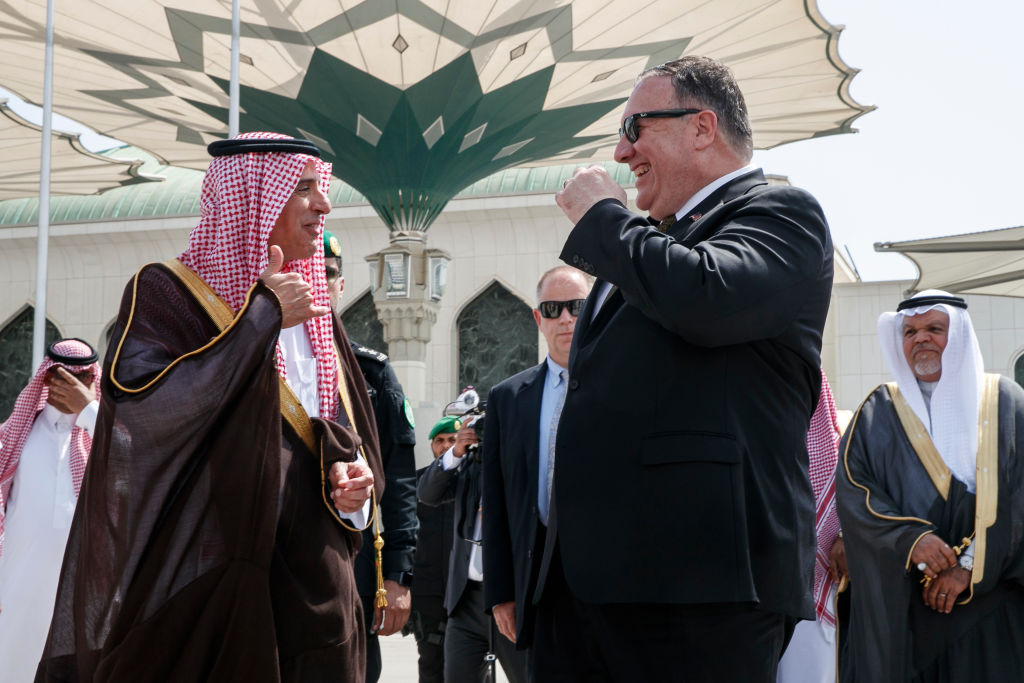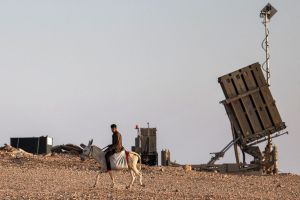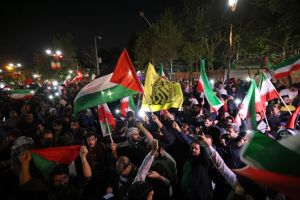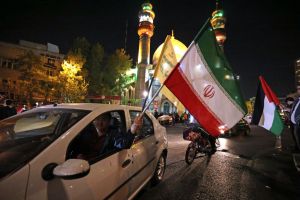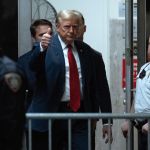‘First, I think it’s really important to understand that the Iranians are sowing disinformation,’ Mike Pompeo told reporters Sunday en route to the Kingdom of Saudi Arabia and the United Arab Emirates (‘two great allies in the challenge that Iran presents.’)
‘You’ll see too,’ the secretary of state continued, ‘that our campaign that began when President Trump took office will continue. On Monday, there’ll be a significant set of new sanctions.’ Sure enough, this afternoon Trump announced intensified sanctions on Iran’s Supreme Leader.
With that, the secretary was off, jetting from Joint Base Andrews to Riyadh and Abu Dhabi. The Kingdom and the UAE have served as the twin pillars of the administration’s Middle East policy since the transition, ostensibly ‘because they approached us first’ as a senior administration official told reporters in the first months of the Trump White House. It’s also because, as a counsellor to the Kingdom told me Sunday night, ‘Iran is the enemy.’
Washington has acted hand-in-glove with these Gulf powers for decades, but the Trump era has borne witness to an even tighter partnership, driven in part by ruthless operatives on all sides: the crown princes Mohammed bin Zayed (MBZ) of the UAE and Mohammed bin Salman (MBS) of KSA, as well as the American crown prince, the president’s son-in-law Jared Kushner.
What matters: UAE and Saudi have gotten pretty much what they’ve wanted for two years. The question, after an aborted strike on the clerical regime in Tehran last week, is whether they will continue to. Mark Dubowitz, CEO of Washington’s peerlessly influential think tank, the Foundation for the Defense of Democracies (FDD), said earlier this year that sanctions on the Iranians need to be dialed up from a six ‘to an eleven.’
The idea is that Tehran 2020 is not Baghdad 2003, but Bucharest 1989. Isolate, humiliate and impoverish the regime and the whole rotten edifice will come tumbling down.
The problem is that is not happening, at least not yet. In the meantime, in the world as it is, the global community has seen Iran doubling down on its hardline. Iran downed the US drone last week, and it won’t shrink from taking similar action. ‘Everyone saw the downing of the drone,’ Rear Adm. Hossein Khanzadi said Monday, per state media. This could ‘always be repeated, and the enemy knows it.’
The US-instigated ‘campaign’ against Iran that Pompeo mentioned was lighter lifting in the early days: nullify the Obama Iran nuclear deal, cut off business ties with a country with few American business ties and designate Iran’s military PNG.
The logic of the Iran hawks has always had a contradiction at the heart of it. If indeed the Islamic Republic is a reckless, theocratic menace, then when pushed, it will behave as a reckless, theocratic menace. Insistence from the hawkish coterie that they don’t want war is disingenuous, as Daniel McCarthy has noted. Just bomb Iran’s navy and oil refineries, says Sen. Lindsey Graham, a Trump consigliere, and surely, that’s the end of it.
But does Trump even believe in his own administration’s ‘campaign’? And if not, how does Pompeo, Trump’s savviest lieutenant, operate from here? The president has insisted, repeatedly, that he does not war, that he will negotiate without conditions: his only aim is a nuclear-free Iran. The door is remarkably open for new talks, and Trump himself, unlike Pompeo and the US Gulf allies, is making no demands on the regime’s regional behavior. Iran serves as the power behind Lebanese Hezbollah, Yemen’s Houthis and Syria’s Bashar al-Assad. Even in January, Trump said that Iran can ‘do what they want [in Syria], frankly.’
Is ‘maximum pressure’ finished – or still just beginning? Only time will tell. Thanks to the bellicosity of Mr Trump’s advisers, it could be too late to stop full-on confrontation. If so, he could well have a disastrous legacy.
On Sunday, Chuck Todd asked the president, if he could have on ‘do over’ in his presidency, what would it be. ‘Well, it would be personnel,’ Mr Trump answered.
